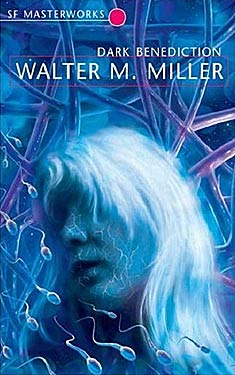Reviewing Miller, Part 2: “Quiet Misery”
 Continuing our series from two weeks ago (apologies for the week-long gap), we will now proceed with the third and fourth short stories in Walter M. Miller’s Dark Benediction series, “Anybody Else Like Me?” and “Crucifixus Etiam,” two very different stories.
Continuing our series from two weeks ago (apologies for the week-long gap), we will now proceed with the third and fourth short stories in Walter M. Miller’s Dark Benediction series, “Anybody Else Like Me?” and “Crucifixus Etiam,” two very different stories.
Anybody Else Like Me?
This story has the feel and narrative structure, oddly enough, of an H. P. Lovecraft short horror story. Thankfully, Miller does not copy the New Englander’s penchant for purpling his prose, and sticks with his workmanlike vocabulary. The protagonist of this short and chilling tale is Lisa Waverly, a wife and mother who is “well-read, well-rounded, well-informed…. Then why this quiet misery?” (30). Miller makes you briefly think that he is going to give you an early-feminist story of self-created female angst and misery like Virginia Woolf’s or Sylvia Plath’s, only to pull out the rug and expose the terrifying reality that is causing Lisa’s mental anguish. She is a mutant and a telepath and feels emptiness in the absence of others like her. Unfortunately, when she finally does meet another of her kind, he turns out to be a frightening scientist who decides they need to be together at any cost. From the early unraveling of Lisa’s mind, to the growing terror of the danger imposing upon her, to the final confrontation between the two mutants, Miller has a firm grasp on the reader’s adrenaline level through the whole ride.
Crucifixus Etiam
Unlike the previous three stories, this one begins far away from the mundane world we know, in the far future of 2134 A.D. and the distant locale of Mars. The protagonist is Manue Nanti, a Peruvian worker who has been sent to Mars as a manual laborer for a mysterious project. Martian residents have the help of implanted oxygen tubes to help them survive in the thin and alien atmosphere. The life-giving oxygen is pumped directly into their blood such that they do not even need to breath, which leads to such a severe weakening of the lungs that those who return to Earth in that condition cannot live without lifelong medical assistance. Manue does not want to become a “troffie,” one of those whose lungs are so atrophied they can barely even speak, but the pain of forcing himself to breath the wispy air slowly takes its toll, as does his ignorance of the work he is doing. Why do the engineers and corporate heads hide their goals from the common workers? “There could be no excuse for secrecy, they felt, in time of peace. There was a certain arbitrariness about it, a hint that the Commission thought of its employees as children, or enemies, or servants” (60). He likewise feels distanced from the practice of his native religion when he attends Mass, which seems out of place “under the dark sky of Mars…. Faith needed familiar surroundings, the props of culture” (56-7). The resolution of both of these realities of alienation comes about by way of a movement hinted at in the story’s title, taken from the Nicene Creed. It is a sad ending, but one appropriate to the themes of the story.
Next week: “I, Dreamer” and “Dumb Waiter.”



















 Full Details
Full Details


No comments yet.
Sorry, the comment form is closed at this time.